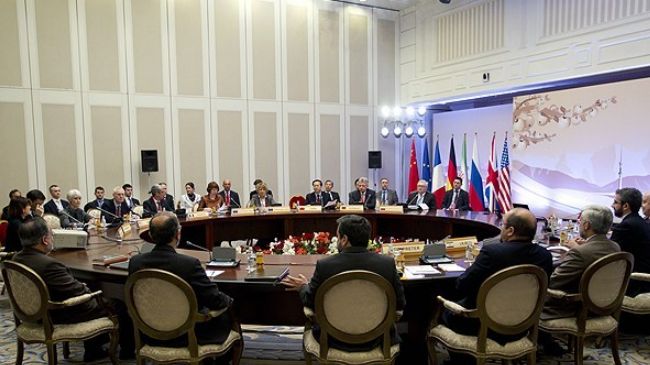Ashton 'cautiously optimistic' over nuclear talks with Iran

By Sara Rajabova
Ahead of the upcoming talks between Iran and the P5+1 group of six major world powers in Almaty, Kazakhstan, the European Union foreign policy chief, Catherine Ashton said remains cautiously optimistic about the outcomes of talks.
"I remain always cautiously optimistic but I'm also very clear that it's very important to get a response," Ashton said at a joint press conference with Turkish Foreign Minister Ahmet Davutoglu in Ankara on Wednesday, Reuters reported.
Ashton said she hopes that the meeting in Almaty will be successful and Iran will now consider the proposal by P5+1 Group and respond to it.
Officials from the P5+1 group, which comprise Britain, China, France, Russia, and the United States plus Germany, are due to hold two-day talks with the Iranian negotiators in the Kazakh city of Almaty on April 5-6.
Meanwhile, Iranian Foreign Ministry spokesman Ramin Mehmanparast said it is possible for Tehran and the P5+1 group to reach an agreement in the upcoming talks, if the group continues with the approach demonstrated in the first round of talks, Press TV reported.
Mehmanparast reiterated that despite the unreasonable attitude demonstrated by the Western members of the group in the past, the Iranian side always entered talks with a positive attitude.
He also added that the main reason that the talks between the two sides did not produce any results in the past was the unreasonable demands made by the P5+1 group while expecting Iran to take "reciprocal" action that was really not at all comparable to the sort of demands they were making.
Iran always reiterated that its nuclear program is peaceful but Western powers suspect Tehran of seeking nuclear weapons capability.
Iran's Ambassador to the International Atomic Energy Agency (IAEA) Ali Asghar Soltanieh said the country's nuclear energy program is a legal right and a national issue with a bright future ahead.
He said Iran uses nuclear technology for completely peaceful objectives, which have been reiterated in the NPT (the Non-Proliferation Treaty), such as energy generation and its use for scientific purposes including in medical and agricultural sectors.
He added that, through its nuclear energy program, Iran seeks a new opportunity to enter modern economic fields.
In meantime, Iran's close ally Russia urges the unconditional recognition of Iran's nuclear rights.
Russia said the unconditional recognition of Iran's right to civilian nuclear energy is a key to the settlement of the West's dispute with this country over its nuclear energy program.
Russian Deputy Foreign Minister Igor Morgulov said Russia is "closely coordinating" with Britain, China, France, the United States and Germany, which are the other members of the P5+1 group, on the issue.
He expressed hope that new proposals made by the group's mediators to Iran during a two-day meeting in late February in the Kazakh city of Almaty could lay the foundation for "consistent progress" in the nuclear talks.
They offered to ease a ban on trade with Iran in gold and other precious metals, and a relaxation of an import embargo on Iranian petrochemical products, the officials say.
In return, Iran would have to suspend uranium enrichment to a fissile concentration of 20 percent at its Fordow facility and constrain the ability to quickly resume operations there.
The Russian official also stressed the common positions Russia shares with China, which has also been opposing the West's unilateral sanctions and political pressure against Iran.
Moscow and Beijing both believe that such counterproductive measures will only undermine diplomatic efforts in solving the standoff and lead to a deadlock, Morgulov said.
On Thursday, Iran's negotiating team arrived in Kazakhstan's Almaty for the nuclear talks with the P5+1 group.
Iran's delegation includes Chairman of the Supreme National Security Council of Iran Saeed Jalili and his deputy Ali Bagheri, Deputy Foreign Minister Seyyed Abbas Araghchi, Foreign Minister's advisor Hamid Reza Asgari, and Iran's former ambassador in UK Rasul Movahedian.
The United States, Israel and some of their allies have repeatedly accused Iran of pursuing non-civilian objectives in its nuclear energy program, with the United States and the EU employing this as grounds to impose several rounds of sanctions against Tehran.
Tehran refutes the allegations, saying that as a signatory of the nuclear Non-Proliferation Treaty and a member of the International Atomic Energy Agency, it has the right to enrich uranium for peaceful purposes.
Here we are to serve you with news right now. It does not cost much, but worth your attention.
Choose to support open, independent, quality journalism and subscribe on a monthly basis.
By subscribing to our online newspaper, you can have full digital access to all news, analysis, and much more.
You can also follow AzerNEWS on Twitter @AzerNewsAz or Facebook @AzerNewsNewspaper
Thank you!
